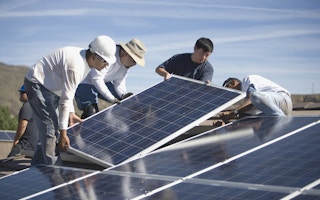Private investors looking for sources of retirement income may now find investing in solar panels more lucrative than traditional pension funds.
To continue reading, subscribe to Eco‑Business.
There's something for everyone. We offer a range of subscription plans.
- Access our stories and receive our Insights Weekly newsletter with the free EB Member plan.
- Unlock unlimited access to our content and archive with EB Circle.
- Publish your content with EB Premium.
A new study by United Kingdom-based solar firm EvoEnergy has found that investing in solar panels can deliver an annual return of more than 10 per cent, compared to just six per cent from a pension fund during the same period.
EvoEnergy compared the estimated returns of what investors can earn in over 20 years if they invest an amount of £5,550 (roughly US$8,928) in either solar panels or in debentures for renewables projects - a form of debt instrument offered by companies based on credit worthiness - compared to a typical managed pension fund.
Steve Wilks, director of finance at EvoEnergy, said they embarked on the study after UK’s former Minister for Climate Change Greg Barker claimed earlier this year that solar could deliver better returns than a pension.
“
Investing in solar is by no means a direct replacement for traditional pension funds, in our opinion. However, what it does offer is a tax-efficient alternative for a lump sum that isn’t susceptible to market fluctuations and can deliver significant returns over the medium to long-term in addition to a pension
Steve Wilks, director of finance, EvoEnergy
“Mr Barker said returns of eight per cent or above could be achieved - what we found was that, with an average, unshaded 3 kilowatt (kW) array installed at a cost of £5,550 upfront, a homeowner could see returns of more than 10 per cent once the feed-in tariff (FiT), export tariff and possible energy savings are accounted for,” explained Wilks.
In UK’s FiT system, households which install renewable energy technologies are guaranteed up to 20 years of payment from electricity suppliers at a rate in line with inflation and in accordance with the Retail Price Index.
When computing for expected returns, some experts suggest that investors must factor in inflation as well as other variables that may affect the returns from solar investments, including the price of electricity, the cost of solar panels and roof maintenance, among others.
However, Wilks stressed that what makes solar an attractive option when it comes to planning for the future is that it could provide an investor an income of more than £600 (nearly US$1000) per year and a moderate 25 per cent saving off his energy bill, which is made possible by the falling cost of installations and the security offered by a 20-year FiT.
“The fact that returns are both income tax free and available before 55 just makes them look even better,” said Wilks.
For those who are investing in larger renewable energy projects through debentures-type schemes, EvoEnergy said investors may get yearly returns as high as eight per cent.
Bruce Davis, managing director of UK-based investment firm Abundance Generation, said generating electricity from solar power offers homeowners a real choice when looking for a long-term income-generating investment in their retirement.
“With the government reforming annuities because of a lack of competition and poor value for retirees, advisers are starting to looking beyond conventional investments and considering a debenture, which can provide an income that is less volatile and access to an uncorrelated asset,” he added.
Solar potentials remain high
Pension fund managers are also finding the solar industry an attractive investment vehicle because it is a safe alternative even if it gives lower returns, according to recent reports.
“Many pension funds decide to invest into solar as it offers a good alternative to government bonds, and at the same perceived risk level offers higher returns,” Bloomberg New Energy Finance solar analyst Pietro Radoia told Bloomberg.
In countries like Singapore, investments in solar have also boomed in recent years because of supportive government schemes coupled with the drop in PV prices, said Christophe Inglin, managing director of Phoenix Solar in Singapore. “It was three years before we made a profit, four years before we recovered the paid up capital, and only in the fifth year that we began to accumulate returned earnings,” Inglin told Eco-Business in a previous interview.
In developing countries like the Philippines, financing renewable energy projects through leasing a solar or wind energy system, where users need only to pay a monthly fixed amount instead of putting lumpsum money upfront, is seen as a good opportunity to push renewable energy expansion in the country.
“Forward-looking investors in search of higher returns and willing to expand their horizons should look to the South Pacific, where taking a little more risk can mean a higher return,” commented Mariana Cardenas, who leads the financing efforts at UGE, a global provider of renewable energy solutions.
“Investing in solar is by no means a direct replacement for traditional pension funds, in our opinion. However, what it does offer is a tax-efficient alternative for a lump sum that isn’t susceptible to market fluctuations and can deliver significant returns over the medium to long-term in addition to a pension,” said Wilks.










